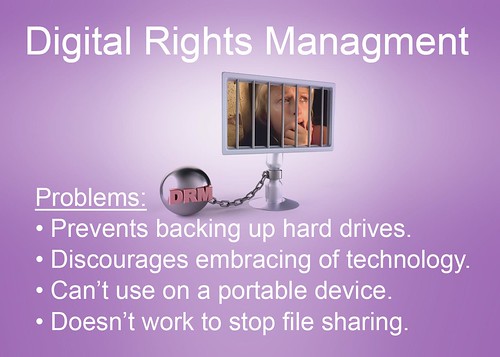Paula Le Dieu from Magic Lantern talks about how personal story telling and passion can go very far despite pressure to be a be formal and rigid and act like a business person. She basically explains that it's good to be a loose cannon. Cool, I like that. She then gives a basic explanation of what Creative Commons is and mentions her involvement with iCommons.
I think the next step for creative commons is to create a voting body of people that are using creative commons for real world media distribution. That way instead of a fixed license it can be a dynamic license that is subject to change. That way with each new edition they can upgrade already licensed work to a new smarter better license.
So what needs to get better about creative commons licenses? Payee info. They theoretically are starting to do it with Creative Commons 3.0 but I don't see anything robust enough yet. What I want is a license you put on a film that allows anyone to exploit and distribute your film pulling it from it's online digital master and converting it into what ever format they. It might be a micro-cinema network or flash based ad revenue video site or their bit-torrent based subscription fee distribution platform. There are so many digital distribution players out there that I think we need a license that can define the split so we can just post once and have the different sites pull down the video rather then us sitting around uploading to hundreds of sites.
Also there needs to be a pass through ability so if something with a license on it gets used in a another piece of content then there needs to be an automatic way to pass proceeds back to all of the creators.

Paula also talks about DRM and points out a lot of it's problems. I made this slide a few months back to show to the Directors Guild of America.
Paula explains the main reason DRM is bad is that it's a hurdle between your work and your audience. But more importantly from a film industry evolution perspective, DRM that aims to lock down content or force content to only get to individuals through certain paths is a problem.
Content needs to flow freely basically because we don't have a choice in the matter and it's going to anyway. So we have to encourage it by removing all copy protection and DRM and instead building social tools that encourage people to voluntarily share their view history with their subscription service they pay X amount of money per month to that then pays the payee information on the license of the content.
Thats the model in my mind and I'm going to keep re-iterating and re-explaining and re-fining the details over and over until I see it getting built. Keep an eye out for my Montreal Presentation on Subscription models I'll be posting soon.
No comments:
Post a Comment